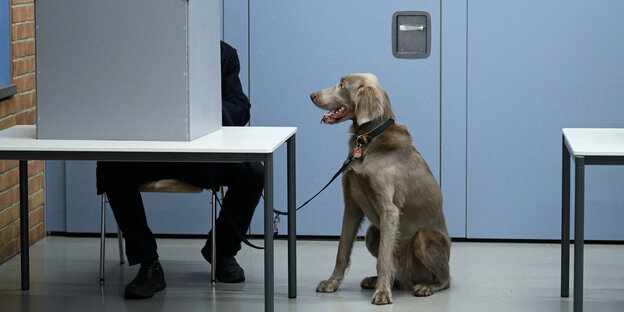Another federal election was held this Sunday in Berlin, at least in some areas of the city. The results will only be known at night.

First mission as an election observer? Oscar the dog Photo: Annegret Hilse/rtr
SEDAN taz | 17:59:58, 17:59:59, 18:00 In any other state or federal election, colored bars would appear on screens across the country: black for the CDU, red for the SPD, etc. ARD election expert Jörg Schönenborn would explain the forecast, after which the party's first leaders would stand before the television cameras and comment on it.
But none of this is happening tonight of the partial rerun of the 2021 federal election in Berlin. Not at the “Kochwerk”, an event venue in the northeastern district of Pankow, where the leading faces of the state CDU gather around its boss Kai Wegner, who is also the head of the city-state government. And not even in the SPD at the “Varia Vineta” theater, a few kilometers away. Here and there it will not be known until 1:30 in the morning whether the constituency won by the Greens in 2021 has been won, when everything is supposed to be counted.
Bars and analysis, would be based on surveys of people after they left their polling stations, the so-called Exit surveys. But that doesn't exist this Sunday. Calculated in terms of majorities and electoral districts, it is simply not enough to make the effort worthwhile and of national interest. Even if new elections were held not only partially but in all of Berlin, the majority of the traffic light coalition would not be in danger.
Barely more than one in five
However, the ruling of the Federal Constitutional Court shortly before Christmas limited the rerun to only 455 of Berlin's more than 2,200 electoral districts. Only a little less than 22 percent of the nearly 2.4 million eligible voters in Berlin can vote, just over one in five. The background to the sentence was the numerous mishaps that occurred in the elections of September 26, 2021, when the federated parliaments and twelve districts were also elected in Berlin, parallel to the Bundestag.
The fact that there is something resembling tension this afternoon is due to the unequal distribution of these 455 electoral districts throughout the city. In Pankow, more than 80 percent have the right to vote. In the southeastern constituency of Treptow-Köpenick, for example, the constituency of left-wing icon Gregor Gysi, the figure is less than 4 percent.
It will only be exciting this Sunday, where there will be many more elections and where the CDU, which is currently booming throughout the country, did not win in 2021, but was not far behind the winners of the constituencies. Realistically, this only affects, apart from Pankow, the Charlottenburg-Wilmersdorf electoral district, the Ku'damm district and the Bahnhof zoo in the west of the city.
The CDU waits for Pankow
It is the city's celebrity constituency: In 2021, former ruling mayor Michael Müller (SPD) overtook Lisa Paus (Greens), who later became Federal Family Minister. But the victory that night could go to the third party at the time, the CDU candidate, who already triumphed here in the 2017 elections.
In Pankow, the CDU candidate was much further behind the winner of the Green constituency in 2021. But new elections will be held there almost throughout the district, and the CDU had already gotten closer to the Greens in the new elections to the House of Representatives in February 2023. Since then, the Christian Democrats have continued to make gains in the polls.
It is therefore no coincidence that the Berlin CDU leadership is currently meeting in Pankow. A victory for the CDU would be an absolute novelty: after reunification, only candidates from the SPD, such as the former president of the Bundestag, Wolfgang Thierse, and the Left Party, or former PDS, won in this constituency.
Everything depends on electoral participation
However, an electoral victory, whether there or in Charlottenburg-Wilmersdorf, would have an unpleasant side effect for the state CDU: its general secretary Ottilie Klein, whom party leader Wegner did not appoint to the position until 2023 and, after 39 years of mandate, -old, great hope for the future of the party, would lose his seat in the Bundestag.
The total number of representatives of the Berlin CDU would remain the same, as it results from the number of second votes. In addition to the winners of the electoral districts, then fewer candidates from the state list would enter. This is the list by which the party fills parliamentary seats if it is entitled to more than it wins in electoral districts, and Klein was the last person to enter the Bundestag in this way for the CDU.
Almost everything depends on the electoral turnout this Sunday: both the electoral victories and the long-awaited signal against right-wing extremism in the form of many votes for the parties on this side of the AfD. Only with a high level of participation can the deficits of those electoral districts whose 2021 results remain intact, when the electoral participation in Berlin was 75 percent, be compensated.
Lower electoral participation
However, at lunchtime it did not seem so: by 12:00 p.m., only 18.3 percent of voters in the 455 affected electoral districts had cast their ballots; In 2021, this value was almost half, that is, 26.8 percent. This trend continues: at 4:00 p.m. it is just under 40 percent, compared to 57 percent in 2021.
The electoral management wants to continually announce the provisional results of the count at night. However, these are not weighted or extrapolated in any way, so they are not taken into account in former Prime Minister Müller's constituency, if the first 20 percent of the votes counted came exclusively from upscale residential areas in Grunewald, who tend to be close to the CDU. Then you will have to wait. However, this usually happens at home: in the CDU “Kochwerk”, for example, it is supposed to end at 9:00 p.m.